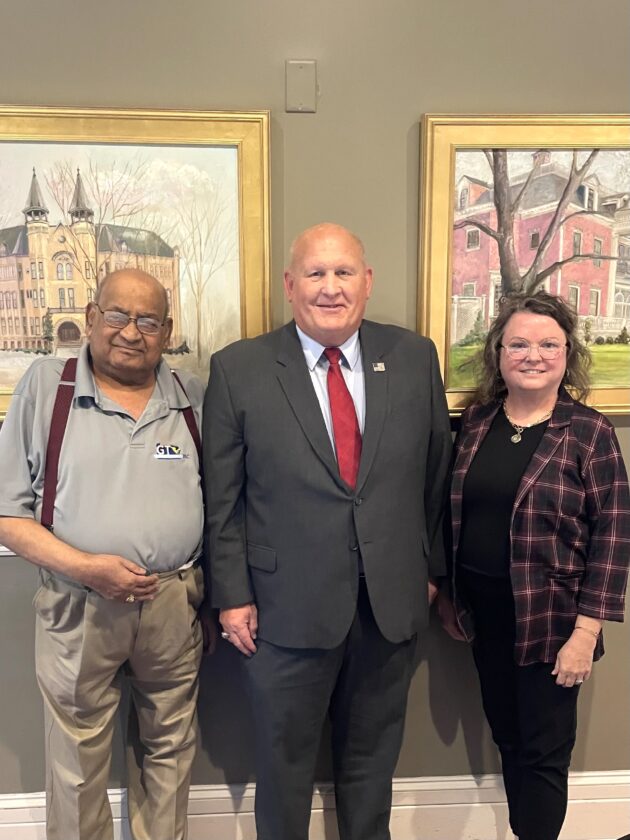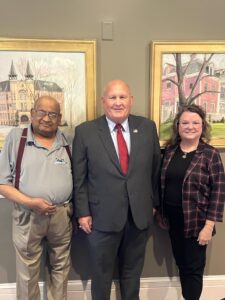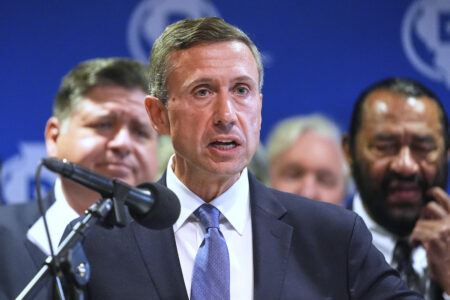Thompson sees ‘great results’ in big bill act

From left are Ash Khare, state committeeman for the Warren County Republicans, U.S. Rep. Glenn “GT” Thompson and Ann-Marie Gariepy of the Times Observer.
The One Big Beautiful Bill Act of 2025 (OBBBA), the massive budget reconciliation bill implementing many of the administration’s top legislative priorities, was signed into law July 4.
The biggest overhaul to America’s healthcare safety net in decades, the 940-page document fundamentally changes how Medicare and Medicaid work and includes significant funding cuts and policy changes to Medicaid and the Health Insurance Marketplaces, Medicare physician payment and medical student loans, among other health care related items, all of which affected more than 130 million Americans who rely on these programs.
The law was passed by a razor thin margin of 218-214 votes.
U.S. Rep. Glenn “GT” Thompson, who represents our region, took the time to discuss the new law during his recent visit to Warren.”I think it’s going to deliver some really great results for every American family. The tax benefits the education benefits, they’re in there,” he said. “There’s so much in that bill. That’s the hard part. That’s why I’m always communicating with people.
“Some of the things I really love. No tax on tips (first $6,000). No tax on overtime. It’s productivity, it’s great for the economy. It’s great for families.
“I like the fact now at my age although I’m not on Social Security yet because I’m still working, no tax on the first so many thousands of dollars on Social Security. I think the president and I both would have liked to see that all Social Security income be exempt from tax.
“Normally when you create a new tax law like all those three you do it incrementally. And that proved true because there’s a lot that we put in the OBBB HR1 or the Budget Reconciliation, it’s all the same thing. Actually we’re referring to the bill today as the Working Family Tax Cut Bill. The things that we made incremental and temporary back in 2017 we now make it permanent this time around. I suspect sometime in the future the tax on tips will be made permanent and extended. So it’s a great start.”
One Big Beautiful Bill Act, in part, removes the ability for medical students to receive Federal Direct Stafford loans and Federal Direct PLUS Loans (medical students will still be able to access Federal Direct Unsubsidized Stafford loans), caps the amount that can be borrowed for school, and limits new federal student loan borrowers to only two repayment options.
“Just a few education benefits I worked on are part of it. I’ve always championed short term Pell. I think you ought to be able to get financial assistance not just when you’re going for a four-year degree or more but when you’re going to go for quite frankly CDL license, when you’re going to go for a career in technological ed, it should help people climb a ladder of opportunity and not just for people who are going for a four-year degrees. There are a lot of essential jobs, most essential jobs that don’t require a four year degree.”
Continuing, Thompson said, “Government has always discriminated against those types of jobs and the pathway to it. We corrected that. I had my short term Pell legislation. It wasn’t perfect I found, they have to get it done in 15 weeks. I have some minor changes I need to get made moving forward, but overall most people pursuing careers in tech ed short term, not a bachelor’s degree but a certification or specialization will now be eligible.”
“For the past four years we had a problem that children of people that owned small businesses and farms their kids really weren’t eligible for student assistance. The last administration had changed the criterion and based it on assets. It’s always been based on revenue. Some small businesses and all farmers are asset rich and cash poor. What part of your farm or small business do you sell to send your kid off to college and still have a farm or small business? We fixed that. The Big Beautiful Bill absolutely fixed that ” said Thompson.
It creates new administrative requirements and conditions on eligibility (including work requirements) for patients seeking to enroll in or maintain Medicaid coverage and restricts states’ ability to use provider taxes to finance their Medicaid programs. Deep cuts of more than $1 trillion over 10 years create the most significant changes since the program started in the 1960s.
Rural hospitals face a perfect storm under the new law. They’re heavily dependent on Medicaid revenue and serve as the economic backbone of their communities.
The American Hospital Association projects that rural hospitals will lose $50.4 billion in federal Medicaid funding over 10 years, while 1.8 million rural residents will lose their coverage.This creates a deadly cycle: hospitals get less money from Medicaid cuts, then face a surge in uncompensated care when newly uninsured patients show up at emergency rooms.
“We’re already having a negative impact.” said Thompson “Rural hospitals have been struggling for some time. It’s very challenging. The changes that were made to medicaid pretty much represents what we’ve done in my jurisdiction of agriculture for nutrition. We’ve required that anybody receiving SNAP benefits between the ages of 18-64 and able to work that you have to do one of 3 things to continue your SNAP benefits. After three months (of initial services) you have to be working, volunteering or engaged in education, that we pay for, for an average of 80 hours a month, so part time. It’s really flexible on how you do it. That has worked well for nutrition benefits. My favorite of those three things actually is the education part. People climb the ladder of opp through career technical education, employment education that the federal government pays for. Folks basically, at one point wake up and based on their income they’re not eligible for SNAP anymore. Those concepts were what was applied to Medicaid.”
When asked if there was a possibility of rural hospitals closing due to the new law Thompson replied simply “I sure hope not.”
Thompson went on to explain, “I think there was a recognition that rural hospitals were already struggling and struggling badly so when they implemented this I think there will be some benefits to rural hospitals. Medicaid only pays 40 to 60 cents on the dollar. They’re actually losing money. If we can help somebody get into gainful employment through the program now that has been attached to Medicaid, commercial insurance pays an average of $1.30 to $1.40 for every dollar of cost. That insurance meets the cost of the hospital. Financially it’s good.”
The law includes a $50 billion Rural Health Transformation Program spread over five years. Critics have called this a political band-aid that doesn’t address the core problem of uncompensated care or provide sustainable long-term funding. Of the funding Thompson said “I don’t think it’s going to be enough money but it’s a really good start. I’m supportive of increasing that fund in the future. I’m a champion for rural hospitals. They’re economic engines.” When asked if cuts to other programs would have to be made to increase funding of the Rural Health Transformation Program Thompson emphatically answered, “No.”
“The root of it was the government created these programs long before my time and figured out quite quickly they couldn’t afford them,” he said. “It doesn’t cover costs. The biggest problem is the government.”




